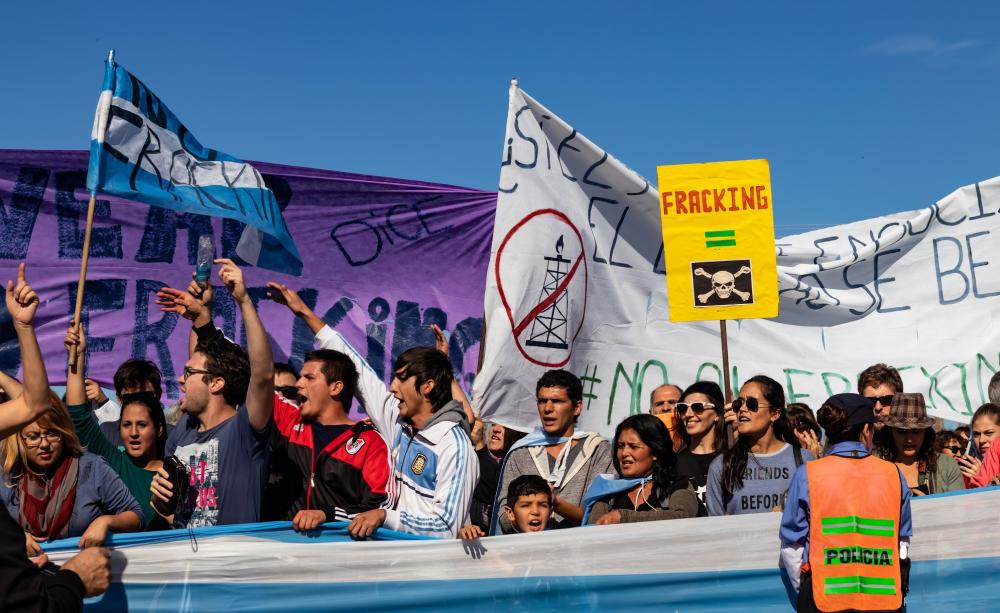*
Vaca Muerta is a mega-project of shale fossil fuel exploitation through hydraulic fracturing - or fracking - in the Argentine Patagonia.
The Argentine Government predicts that gas and oil export revenues from this reservoir will surpass those from agricultural production by 2027. Meanwhile, as chair of the G20, the country promotes gas as a "bridge fuel" to other, more sustainable sources.
If government expectations are met, the project will multiply gas emissions, as recently warned by the UN Committee on Economic, Social and Cultural Rights (CESCR).
Gas exports
In September, Argentina resumed gas exports that had been shut down in 2007 because the country was not self-sufficient.
During a visit to the exploitation zone a few weeks ago, President Mauricio Macri said: "We won't stop until we export 30,000 million dollars in gas and oil from Vaca Muerta, and to do that we have generated more than half a million jobs throughout the country." Today, exports are only a distant prospect, and employment is far from the president's wishes.
At the moment, there are about thirty exploitation projects for the Vaca Muerta formation. In addition, the national companies present in the area are BP (which owns 50 percent of Pan American Energy, the second crude producer), Total (second gas producer), Shell, Wintershall, Equinor, ExxonMobil, Chevron, CNNOC, Dow, Petronas, among many others.
Only three projects have reached the stage of massive exploitation in Vaca Muerta. Two are operated by YPF, the mixed company controlled by the State, the largest producer and the one controlling the largest area.
The third area was awarded to Tecpetrol, a subsidiary of the Techint group, which has become the star of gas production. In September, the firm produced 13 MMm3 daily — 10 percent of the country's total volume — after a sharp rise that started this year at 5 MMm3. Tecpetrol reached these levels thanks to the massive gas-targeted subsidies guaranteed by the State: USD 3.5 per MMbtu.
Total exploitation
The increase in extraction and the resumption of gas exports are consistent with the principles of the G20 - which is chaired by Argentina this year - and will hold its annual meeting at the end of November.
The group promotes gas as a "bridge fuel" to sustainable energy sources. This claim is contested by various experts, among other reasons, due to fugitive methane emissions, which are 80 times worse than CO2 for climate change.
Contrary to government expectations, the UN Committee on ESCR warned in October that the implementation of this project would have a negative impact on the climate: "Total exploitation, with hydraulic fracturing, of all the shale gas reserves [at Vaca Muerta] would consume a significant percentage of the world's carbon budget for reaching the goal of a 1.5 degree Celsius warming."
The committee recommended that the Argentine state "reconsider" the exploitation of unconventional hydrocarbons.
Estimated at 19.9 billion barrels of crude oil and 583 trillion cubic feet of gas, the resources currently buried in the ground represent around 50 billion tons of CO2 that can only be extracted through hydraulic fracturing (or fracking), a highly controversial technique that has been banned in several countries and subnational states.
In the same document, the UN also warned about the territorial effects, the lack of consultation with the local communities, and the absence of adequate regulation to address the risk entailed by hydraulic fracturing.
Unconstitutional ruling
In recent years, a series of tight gas projects - enabled by the investments made to exploit Vaca Muerta - have begun to be developed in the vicinity of one of the country's most important water basins, in areas historically involved in fruit and vegetable production, and in urban outskirkts.
Warned about the risk of fracking, over 60 municipalities have banned the technique. However, the justice system has declared several of these rulings unconstitutional on the grounds that they exceed communal powers.
At the national level, the energy policy is being heavily criticized, mainly due to the steep increases in tariffs for energy supply. The agreement with the IMF requires that Argentina continue on this path in order to reduce the fiscal deficit.
The peso devaluation (190 percent against the US dollar this year), coupled with dollarized tariffs, has caused energy bills to reach amounts impossible to pay for both companies and households. The average increase in gas in the last 24 months has been around 1300 percent.
Opposition to the tariff hikes has added to the general condemnation of the government and managed to unite the entire range of opposition parties around a law that brought the increases back to their November 2017 levels. However, President Macri vetoed it in May and replaced his Minister of Energy a few days later.
This Author
Fernando Cabrera is the coordinator of Observatorio Petrolero Sur (OPSur), an Argentinian civil society energy watchdog.




